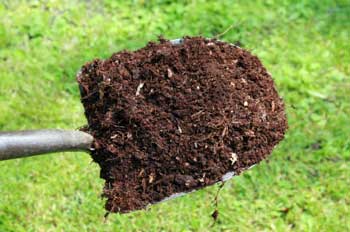Manure can be added to garden beds, compost piles or worm farms once it is aged and well rotted. It serves to increase organic matter in the soil and provides a food source for beneficial microbes.
MANURE (or why sometimes it's good to be in the poo!)
 Preferably, manures should be well aged before using directly on garden beds. Fresh manures can be added to a compost pile, or left (covered to keep out flies) for a month or two until relatively odourless and ready to use. Fresh manures can contain excessive nitrates which can 'burn' some sensitive plants, and will also have a very high pH.
Preferably, manures should be well aged before using directly on garden beds. Fresh manures can be added to a compost pile, or left (covered to keep out flies) for a month or two until relatively odourless and ready to use. Fresh manures can contain excessive nitrates which can 'burn' some sensitive plants, and will also have a very high pH.
Animal manures are a great way of adding nitrogen to soil, and organic matter, and help stimulate microbial activity.
Which manure is best?
Quite frankly, any manure is going to help improve soil - however, different poos do different things. the richest manure (in terms of range of nutrients) is actually pigeon poop! Chicken and other poultry manure also packs a pretty good punch - but bird poo contains hardly any organic matter.
In contrast, horse and cow and sheep manure is lower in nutrients, but is much higher in organic material - which is really useful to improve soil.
Pig manure is somewhere in the middle - depending on the diet of the animal. Rabbit, alpaca & guinea pig poo are also fine to use.
Some gardeners may swear by sheep poo for this and cow poo for that - and never the twain shall mix! In our experience, variety is the spice of life and - like us - your soil benefits from a varied diet.
Manure can be used (once it is aged) distributed on top of garden beds or dug through the soil. It is also great to add to compost heaps or worm farms.
Our Manure Products include:
Blended Manure
A weed free blend of sheep and pulverised cow manure. Feeds and adds organic matter.
Available in bulk or 25 litre bags.
Multigrow
Composted and pelletised chicken manure. An effective, Certified Organic all purpose fertiliser.
Available in 15L and 14kg bags.